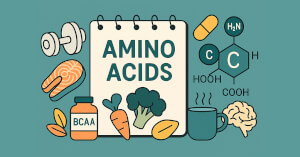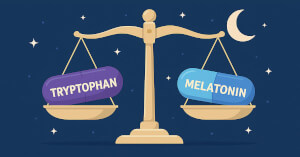
High cortisol can make you feel exhausted, anxious, wired, and unable to sleep. When this hormone stays elevated for too long, it can also increase inflammation throughout the body.
This type of chronic inflammation is linked to weight gain, digestive problems, elevated blood pressure, and a weaker immune system.
The good news: you can bring cortisol down naturally with simple lifestyle habits and targeted supplements.
What Is Cortisol and Why It Matters
Cortisol is a hormone released by your adrenal glands. Your body produces it as part of the natural stress response. You need cortisol to wake up in the morning, regulate your blood sugar, and help your body respond to challenges.
The problem appears when cortisol stays high for too long. Chronic elevation pushes your nervous system into a constant state of alert, which makes you feel tense and restless. Over time, high cortisol also increases inflammation in many tissues of the body. This type of ongoing inflammation has been linked to more serious problems such as belly fat accumulation, insulin resistance, poor sleep, low libido, and a higher risk of cardiovascular issues.
Managing stress and supporting healthy cortisol levels can help you feel calmer, sleep better, and maintain a more stable mood and energy throughout the day.
Signs Your Cortisol Might Be High
You might not realize your cortisol is high until the symptoms start affecting your daily life.
Some of the most common signs of high cortisone levels include:
- Difficulty falling asleep or waking up in the middle of the night
- Feeling tired in the morning but wired in the evening
- Belly fat that is hard to lose
- Increased cravings for sugar and salty foods
- Frequent irritability or anxiety
- Low libido
- Brain fog or trouble concentrating
Best Lifestyle Strategies to Lower Cortisol Naturally
Improve Your Sleep Routine
Your body follows a natural 24 hour rhythm that determines when cortisol rises and falls. Cortisol should be high in the morning and low at night. Irregular sleep schedules, late screen exposure, and inconsistent bedtimes can disrupt this rhythm. Going to bed and waking up at the same time every day helps stabilize cortisol production.
Limit Caffeine After Midday
Caffeine increases cortisol for several hours after you drink it. If you feel anxious or have trouble sleeping, stopping caffeine after 12 p.m. can make a big difference. Some people benefit even more by avoiding caffeine completely for one or two weeks to assess how their mood and sleep respond.
Eat Balanced Meals
Very low calorie diets or long gaps without food can trigger a cortisol rise. Eating enough protein, healthy fats, and fiber helps stabilize blood sugar, which keeps cortisol more stable. Foods rich in magnesium and antioxidants can also support a calmer nervous system.
Exercise Without Overtraining
Moderate exercise helps lower cortisol, but very intense or prolonged training can raise it temporarily. If you feel burned out, try adding more walking, gentle strength training, or low impact cardio while reducing high intensity intervals.
Practice Short Stress-Reduction Habits
Simple techniques, even for five minutes a day, can lower cortisol. Examples include slow breathing, stretching, spending time outdoors, journaling, or taking a short break away from screens.
Best Supplements to Reduce Cortisol
Ashwagandha
Ashwagandha is one of the most studied adaptogenic herbs. Adaptogens help the body respond to stress in a more balanced way. In a clinical study from 2019, participants who took ashwagandha daily showed a significant decrease in cortisol levels and reported better sleep and less anxiety.
✔️ Typical Dosage Range: 300 mg to 600 mg per day.
Magnesium Glycinate
Magnesium plays an important role in muscle relaxation and nervous system balance. Many adults do not meet their daily magnesium needs, which may worsen stress and sleep issues. Magnesium glycinate is gentle on the stomach and is commonly used to support calmness in the evening.
✔️ Typical Dosage Range: 200 mg to 400 mg in the evening.
L-Theanine
L-theanine is an amino acid found in green tea. It promotes relaxation without causing drowsiness. In several studies, L-theanine has been shown to reduce stress-related tension and improve focus by increasing alpha brain waves, which are associated with a calmer mental state.
✔️ Typical Dosage Range: 100 mg to 200 mg once or twice daily.
Rhodiola Rosea
Rhodiola is another adaptogen known for improving stress resilience and reducing fatigue. In a clinical trial from 2020, people taking Rhodiola experienced improvements in mood and energy, especially during periods of high work-related stress.
✔️ Typical Dosage Range: 200 mg to 400 mg per day.
Phosphatidylserine (PS)
Phosphatidylserine is a natural compound found in cell membranes. It has been shown to reduce cortisol spikes after physical and mental stress. It may be especially helpful for people who feel wired at night or wake up frequently.
✔️ Typical Dosage Range: 100 mg to 300 mg in the evening.
Omega 3
Omega 3s reduce inflammation and can support a more balanced stress response. In several studies, higher omega 3 intake has been linked to lower cortisol in people exposed to chronic stress.
✔️ Typical Dosage Range: 1 g to 2 g per day of combined EPA and DHA.
How to Build a Daily Anti-Cortisol Routine
Bringing cortisol down is easier when healthy habits are repeated consistently. Here is a simple routine you can adapt to your lifestyle:
Morning: Get sunlight exposure, drink water before caffeine, and eat a balanced breakfast with protein.
Afternoon: Take short movement breaks, manage caffeine carefully, and eat meals that keep your blood sugar stable.
Evening: Dim the lights, reduce screen use, avoid heavy meals late at night, and consider magnesium or phosphatidylserine if sleep is difficult.
When to See a Doctor
If your symptoms persist despite lifestyle and supplement changes, or if you experience major sleep problems, severe fatigue, or unexplained weight gain, it may be helpful to speak with a healthcare professional. In rare cases, extremely high or low cortisol can indicate hormonal conditions that require medical evaluation.
Frequently Asked Questions
How can I decrease cortisol levels naturally?
You can lower cortisol naturally by improving your sleep routine, limiting caffeine after midday, eating balanced meals, and using stress reduction practices like slow breathing or daily walks. Some people also benefit from adaptogenic herbs such as ashwagandha or Rhodiola.
What are the best supplements for lowering cortisol?
The supplements most often used to support healthy cortisol levels include ashwagandha, magnesium glycinate, L-theanine, Rhodiola rosea, omega 3 fatty acids, and phosphatidylserine. These may help improve calmness, sleep quality, and resilience to stress.
How do I lose cortisol belly fat?
Cortisol belly fat often improves when you stabilize your sleep, reduce caffeine, manage stress, and avoid extreme dieting. Regular strength training, balanced meals with enough protein, and healthy cortisol supporting supplements can also help reduce abdominal fat linked to chronic stress.
Does magnesium lower cortisol?
Magnesium helps relax the nervous system, improve sleep quality, and stabilize stress responses. Many people notice lower tension and better mood when their magnesium intake increases, especially in the evening.
Can ashwagandha really reduce cortisol?
Several studies have shown that daily ashwagandha supplementation can reduce cortisol in people experiencing chronic stress. Many users also report calmer mood and better sleep after a few weeks.
Does intermittent fasting raise cortisol?
Intermittent fasting may temporarily increase cortisol, especially if you are under-eating or training intensely while fasting. Eating enough protein, staying hydrated, and avoiding excessive fasting windows can help keep cortisol more stable.
Does caffeine increase cortisol?
Caffeine raises cortisol for several hours after consumption. If you are sensitive to stress or have trouble sleeping, limiting caffeine to the morning can help bring cortisol down.
How long does it take to lower cortisol levels?
Most people notice improvements within 2 to 4 weeks when combining better sleep, balanced nutrition, reduced caffeine, consistent exercise, and targeted supplements. In some cases, changes can appear sooner.
Can high cortisol cause weight gain?
Chronically elevated cortisol can increase appetite, promote fat storage around the abdomen, and make weight loss more difficult. Addressing stress and sleep often helps improve body composition.
This article was originally published on Stackbb, your trusted source for science-based supplement guides.








